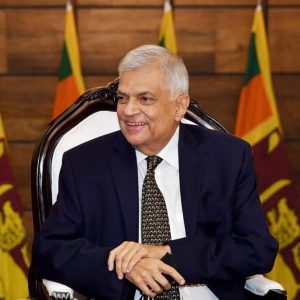On July 20, Sri Lankan parliamentarians elected Ranil Wickremesinghe as the country’s eighth executive president. The way Wickremesinghe won the election proved in the eyes of many Sri Lankans that he had the backing of the Rajapaksa family, which despite being ousted from power still controls Sri Lanka Podujana Peramuna (SLPP) MPs. His election also bolstered accusations that Wickremesinghe will protect the Rajapaksas from myriad allegations leveled against them.
This perception, as well as the fact that he depends on the continued support of the SLPP to secure his grip over power, makes it harder for Wickremesinghe to implement the political and economic reforms that Sri Lanka desperately needs for domestic legitimacy and international assistance.
Soon after his election, Wickremesinghe appointed Dinesh Gunawardena as the new prime minister. Gunawardena is now talking to political parties to form an all-party government.
It must be noted that the main opposition parties, the Samagi Jana Balawegaya (SJB), the Tamil National Alliance (TNA), and the Janatha Vimukthi Peramuna (JVP), as well as former constituents of the Gotabaya Rajapaksa government that now sit independently in Parliament, all backed Wickremesinghe’s opponent, Dullas Alahapperuma, an SLPP dissident, in the presidential election.
The proposal to establish an all-party government goes back to 2020, to the beginning of the COVID-19 pandemic. Lanka Sama Samaja Party MP Tissa Vitharana had suggested then that the Gotabaya administration must consider the pandemic a national emergency and form an all-party government. Almost 18 months later, the Sri Lanka Freedom Party, an important constituent of the Rajapaksa administration, too proposed an all-party government to overcome the economic difficulties faced by the country. Later, the cause of an all-party government was taken up by leaders of 11 constituent parties of the Rajapaksa administration.
Despite guarded but positive responses from opposition political parties, Gotabaya was not interested in such a set-up, which would have limited his powers and opened his actions to scrutiny.
Gotabaya began exploring the idea only after nationwide protests hit his administration; Wickremesinghe was one of the few opposition members of Parliament to express any interest in joining. Wickremesinghe is now in a similar situation to that which confronted Gotabaya.
In the presidential vote in Parliament, Wickremesinghe got the votes of 134 MPs. This propelled him into the presidency. But his power outside Parliament is fragile.
The main opposition parties are unhappy with the way in which Wickremesinghe became president. Following the election, JVP leader Anura Kumara Dissanayake and SJB General Secretary Ranjith Madduma Bandara accused Wickremesinghe of bribing MPs. Parliamentarian Weerawansa, a leader of the independent MPs, predicted that Wickremesinghe’s reign will end in a blood bath.
The above-mentioned groups are closely attuned to the public mood and sentiments of mass anger and would be unwilling to join Wickremesinghe unless he presents a proposal that envisages genuine power-sharing with the opposition. However, whether such a compromise would be acceptable to Wickremesinghe’s backers is questionable.
When those loyal to former Prime Minister Mahinda Rajapaksa attacked anti-government protestors on May 9, Wickremesinghe condemned the attacks and threatened to withdraw from all discussions he was having with the Rajapaksa administration on resolving the economic crisis.
However, within 24 hours of becoming president, Wickremesinghe deployed troops to dislodge protesters from the area near the Presidential Secretariat, despite the assurances by protesters that they would vacate the premises by that afternoon.
These attacks have undermined Wickremesinghe’s credibility among many Sri Lankans and the diplomatic community. The Western diplomatic corps condemned the attack. The United Nations and the International Monetary Fund have urged the government to end the political instability. Wickremesinghe, uncharacteristically, took a confrontational stance, comparing his actions to the actions taken by the U.S. law enforcement agencies during the 2021 Capitol Hill Riots.
Given that Sri Lanka depends heavily on the Generalized System of Preferences (GSP) concessions from the U.S. and the European Union, the Wickremesinghe government needs good relations with the Western powers. The West and Japan are doubly important to the administration because it is unlikely that China would provide significant financial assistance to a government without a strong hold on power.
The political future of the Wickremesinghe administration depends on its ability to convince the domestic and international audience of its legitimacy. And the only way it can achieve this is by establishing an all-party government, which will bring political stability to the country. Sri Lanka has been mired in turmoil since March.
Sri Lanka desperately needs political stability to finalize a bailout package from the IMF to secure bilateral aid and to carry out economic and political reforms that will be painful for many.
Thus, the success of the Ranil Wickremesinghe administration will depend on its ability to secure the support of political parties in Parliament and to present a policy framework that will be acceptable to Sri Lankans. The stability that stems from such a development can be translated into assistance from the international community, which would hesitate to support an unstable government.






























